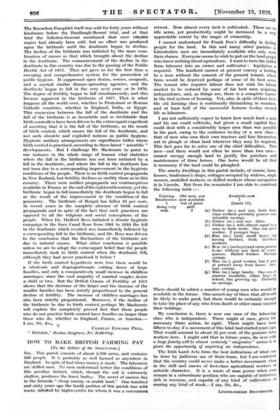HOW TO MAKE BRITISH FARMING PAY [To the Editor of
the SPECTATOR.] Sin—This parish consists of about 2,700 acres, and contains 850 people. It is probably as well farmed as anywhere in England. In spite of bad times money is made. The labourers arc skilled men. No men understand better the conditions of this peculiar district, which, though the soil is extremely shapow, produces the finest barley. The secret of success lies in the formula " sheep raising to arable land." One hundred and sixty years ago the heath portion of this parish was wild waste, infested by highwsyrnim for whom it was a convenient retreat. Now almost every inch is cultivated. There are no idle acres, yet productivity might be increased to a very appreciable extent by the magic of ownership.
I cannot understand Sir Frank Fox's difficulty in finding people for the land. In this and many other parishes is Lincolnshire men are immediately available who only want their chance. Everyone seems to wish to put on the land people who know nothing about agriculture. I want to turn the skilled farm labourer into an owner and cultivator : legislation is
required. The landlord cannot at present convey a holding to a man without the consent of the present tenant, whose farm would be deprived perhaps of some of its best acres. The tenant who requires labour does not wish his labour market to be reduced by some of his best men acquiring independence, and, as things are, there is a complete barrier in the tied system of housing. Yet, also, in spite of these facts the old farming class is continually diminishing in numbers, and at least half of the successful farmers to-day started life as labourers.
I am not sufficiently expert to know how much land a man and his son could cultivate, but given a small capital they could deal with a considerably larger area than was possible in the past, owing to the existence to-day of a new class— that of men who own their own tractors and hire themselves
out to plough or dean land wherever they may be required. This fact goes far to solve one of the chief difficulties. Two
men—and there would not often be more than two men— cannot occupy enough land to justify the purchase and maintenance of three horses. One horse would be all that is necessary if the land could be ploughed.
The ninety dwellings in this parish include, of course, farm- houses, tradesmen's shops, cottages occupied by widows, single women, unskilled workers, or skilled workers whose occupation is in Lincoln. But from the remainder I am able to construct the following table :—
Available now 7 (hands 12).
Father (m.) and son, both first. class workers probably possess con- siderable savings.
Father (m.) and son ditto. Father (in.), wife almost equal to a man in farm work. One son good worker. 2 younger boys.
(d) Man (m.) (only small boys) tut having brother, both excellent workers.
(c) Men (m. ) (no boys) and owns present hcuss without any land of conse- quence. Skilled worker. Savings certain.
Man (m.), good worker, has 2 sons at present away from home. Sav- ings certain. (8) Man (in.) large family. One son at present available, other boys at school, but growing up. Probably no savings.
There should be added a number of young men who would be available in the future. One cannot say of these that all would be likely to make good, but there would be certainly enough
to take the place of any who from death or other cause vacated their holdings.
My conclusion is, there is now one man of the labouring class who is independent. There might at once, given the necessary State action, be eight. There might have been fifteen to-day if a movement of this kind had started years ago. That would amount to about 25 per cent. of the genuine farm workers here. I might add that in future years, the men with a large family will be almost certainly " emigrative" unless he is given the opportunity of acquiring an independence.
The Irish Land Acts form the best indications of what can be done by judicious use of State loans, but I am confident that the country could never make a better investment than in the skill and sinews of first-class agricultural workers of suitable character. It is a waste of man power when men remain in a subordinate position who are capable of initiative, rich in resource, and capable of any kind of cultivation or rearing any kind of stock.—I am, Sir, &c., Existing Old men, not Smallowner. now available
1 but of great doing very skill welL 7 (a)
. . LrNeol-NsitinE INeummisi.














































 Previous page
Previous page